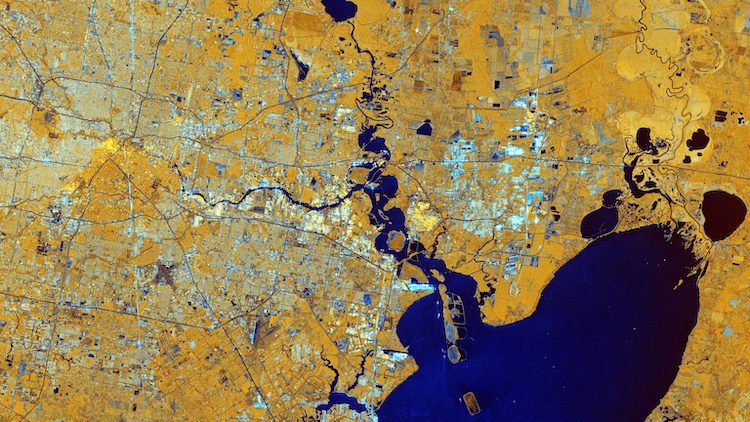Circle of Blue publishes "Water, Texas"
The digital print and podcast series, to publish every Monday in August, reveals how the pandemic and an unlikely energy crisis are dramatically upending the Texas economy—and how water flows through every piece of the puzzle. Water, Texas is funded by a grant from the Cynthia and George Mitchell Foundation.
AUSTIN (August 3, 2020)—A compelling story of vulnerability and consequence is the common thread that weaves together a new digital print series, Water, Texas, revealing how Texas’ booming population and economic growth face an evolving paradigm as the state grapples with realities of water supply and demand.
The series is produced and written by Circle of Blue, the independent news and science agency that reports on global freshwater issues. It features long-form stories that span the geographically and socio-economically diverse landscape of the Lone Star State—reaching across the former Republic’s almost 400 miles of coastline along the Gulf of Mexico, the gushing springs of the Texas Hill Country, and the tapestry of irrigation systems that comprise 2,000 miles of canals and underground pipelines beneath the harvests of the Rio Grande Valley.
Water, Texas takes an in-depth look at the issues, individuals, organizations, and policies that influence water in Texas—from surface water and groundwater to wastewater and stormwater—and how they affect the drying state's landscape, residents, and supply of clean fresh water.
Circle of Blue also produced a Water, Texas podcast series that airs on Spotify, SoundCloud, and iTunes.

The 5-part series closely examines crucial aspects of the state’s resource challenges: demand and supply in the Texas Hill Country, energy development risks to the greater Big Bend region, water innovations in three major Texas cities, how the new border wall intrudes in the ever-present civic conversation about water supply and growth in the Lower Rio Grande Valley, and the influence of water and drought on the Texas economy.
The series—beginning today (August 3) and publishing every Monday during August—includes sources talking about urban and energy sprawl, the mountains and towns of the greater Big Bend region of West Texas, and the Rio Grande River, which serves as the natural border between Mexico and Texas.
Key findings include:
- The mismatch between industrial growth and securing water supply in Texas is so disproportionate in wet years that the next deep drought in a bigger, more populous, and thirstier Texas is likely to be far more dangerous.
- A sharp downturn in the oil and gas sectors caused by overproduction and a geopolitical oil price war, followed by the Covid-19 global pandemic this year, produced market conditions that have put energy development in the greater Big Bend region on pause.
- The cities of Austin, El Paso, and San Antonio serve as innovators in water planning, technology, and use.
- Projections in federal and academic studies on climate change predict that water flows in the Rio Grande will shrink and evaporation from large reservoirs upstream will increase.
Circle of Blue is the internationally recognized independent journalism, science, data, and convening network that reports on global resources, particularly the systemic challenges between water, food, energy, and the environment in a changing climate. Its multi-disciplinary work, convenings, and collaborations across the Great Lakes, U.S., China, Australia, Mexico, India, and the Middle East earned the Rockefeller Foundation Centennial Innovation Award. The series is authored by former New York Times and Polk Award-winning journalist Keith Schneider and photographed by Brian Lehmann, a regular contributor to National Geographic and The New York Times.
Water, Texas is made possible by a grant from the Cynthia and George Mitchell Foundation.
For media inquiries or more information about this series, contact Brett Holmes at brett@graysuit.org or +1 (713) 244-4178, or visit CGMF.org's special section on Circle of Blue's "Water, Texas."

NEWS
Hide Full Index
Show Full Index
View All News